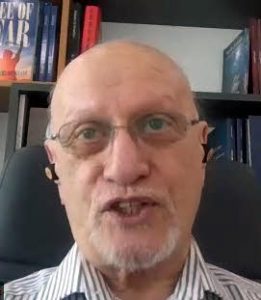Interview with Hussain Al-Shahristani, new president of Pugwash Conferences on Science and World Affairs ― Nuclear weapons do not provide security
Jul. 22, 2024
Pugwash hopes to hold international conference in Hiroshima in 2025, 80 years after atomic bombings
by Kana Kobayashi, Staff Writer
Hussain Al-Shahristani, a scientist and Iraq’s former Minister of Oil, has been named the new president of the Pugwash Conferences on Science and World Affairs, a global organization of scientists dedicated to the elimination of nuclear weapons. A person of conviction, he endured 11 years of imprisonment and torture under the former regime of Saddam Hussein for refusing to cooperate in the development of nuclear weapons. In an online interview with the Chugoku Shimbun, Mr. Al-Shahristani emphasized that, “Nuclear weapons do not provide security for any nation.”
You assumed the post taking over from the late Sergio Duarte, the last president of the organization and former High Representative for Disarmament Affairs of the United Nations who was preceded by Jayantha Dhanapala, former Under-Secretary-General of the United Nations. What made you decide to accept the position?
Now, for the first time since the end of the Cold War in 1989, tensions among the nuclear-weapons states have risen to unprecedented levels, with threats being made to use nuclear weapons involving the ongoing conflicts in Ukraine and the Palestinian-controlled Gaza Strip. As I was elected to the position by the Pugwash Council under these circumstances, I decided that I would dedicate my life to the elimination of nuclear weapons.
What issues do you consider to be the most important?
There are indications that the United States, Russia, and China are moving to upgrade their nuclear facilities. This is unacceptable because resumption of nuclear testing could invite expansion of the nuclear arms race. We also call on the United States and Russia to extend the New Strategic Arms Reduction Treaty (New START, which expires in 2026).
International deliberations aiming at the establishment of a Middle East Zone Free of Nuclear Weapons and Other Weapons of Mass Destruction have yet to make any progress. Pugwash hopes to pursue initiatives to bring together nations from around the world to resume discussions on that issue. Of course, the ultimate goal for all of us is to realize a world without nuclear weapons through the Treaty on the Prohibition of Nuclear Weapons (TPNW). Pugwash alone cannot address all these issues. But together with the goodwill of people around the world, we, as an organization of scientists, want to do our part to eliminate nuclear weapons.
You reportedly refused to cooperate in the development of nuclear weapons despite being subjected to severe torture at the hands of the former Hussein regime, proclaiming it to not be in the national interest.
When people are faced with a choice between losing their freedom or even their lives and causing the death and suffering of hundreds of thousands of people, the choice is simple. A half-brother of former President Saddam Hussein once declared to me that nuclear weapons could reshape the map of the Middle East. It is easy to imagine what would have happened if a nuclear weapon had fallen into the hands of someone who would not hesitate to wage war and take the lives of so many.
Do nuclear weapons prevent wars and strengthen cooperative relations with neighboring countries, or contribute to security? The answer is obvious when we look at Israel. Nuclear weapons do not provide security for any nation and, in fact, they only make things worse.
Do you have any thoughts about the A-bombed cities?
The people of Hiroshima and Nagasaki, who experienced the devastation of the atomic bombings, have been at the forefront of the movement aiming at a world without nuclear weapons. The suffering they endured must never be repeated anywhere in the world. Pugwash hopes to hold an annual international conference in Hiroshima next year on the occasion of the 80th anniversary of the atomic bombing. We would appreciate the support to make this happen.
Profile
Hussain Al-Shahristani
Born in 1942 in Karbala, a city in central Iraq, Mr. Al-Shahristani received his doctorate in nuclear chemistry from the University of Toronto, in Canada, and engaged in studies at a nuclear research center and the University of Baghdad, among other organizations. In 1979, under the Hussein regime, Mr. Al-Shahristani was imprisoned at Abu Ghraib prison, but escaped with his life in 1991. After the collapse of the Hussein regime in 2003, he served in a variety of positions, including as vice president of Iraq’s National Assembly, the Minister of Oil, and the Minister of Higher Education and Scientific Research. He took up his current post in May.
Keywords
Pugwash Conferences on Science and World Affairs
The Pugwash Conferences organization was founded in 1957, when its first meeting was held in the village of Pugwash, Canada, spurred by the Russell-Einstein Manifesto of 1955, which had been signed by 11 internationally prominent physicists, philosophers, and others, including Hideki Yukawa, who were alarmed by the race in hydrogen bomb testing between the United States and the Soviet Union. The conferences’ science-based proposals and calls for dialogue helped advance such agreements as the Partial Test Ban Treaty (PTBT) and the Nuclear Non-Proliferation Treaty (NPT). The organization was awarded the Nobel Peace Prize in 1995. Pugwash international conferences were held in Hiroshima in 1995 and 2005, and in Nagasaki in 2015.
(Originally published on July 22, 2024)








